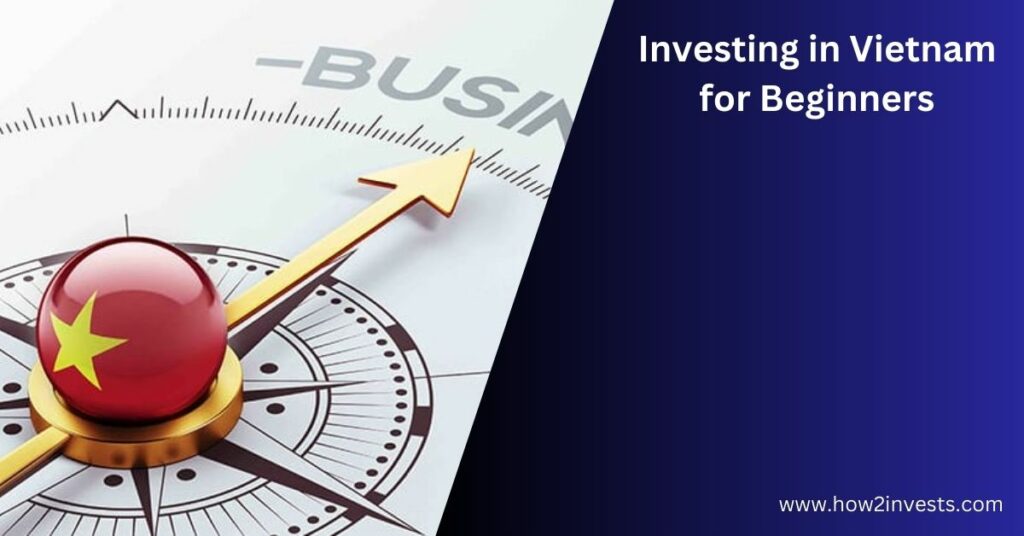Investing in Vietnam For Beginners To Expert In 2023

Vietnam, a Southeast Asian nation known for its vibrant culture, stunning landscapes, and rapid economic growth, has become an increasingly attractive destination for investors around the world.
With its young and dynamic population, improving infrastructure, and business-friendly environment, Vietnam offers a range of investment opportunities for both local and foreign investors.
This guide aims to provide beginners with essential insights into investing in Vietnam, covering key aspects such as the economy, sectors of interest, legal considerations, and practical tips.
Understanding the Vietnamese Economy
Vietnam’s economy has experienced remarkable growth over the past few decades, transitioning from an agrarian society to a bustling manufacturing and services hub. The country’s strategic location, abundant natural resources, and diligent workforce have contributed to its economic success.
Vietnam’s GDP growth has consistently outperformed many other countries in the region, making it an attractive destination for investors seeking emerging market opportunities.
Promising Investment Sectors
Manufacturing and Export: Vietnam is a manufacturing powerhouse, especially in industries like electronics, textiles, and footwear.
The country’s membership in trade agreements like the Comprehensive and Progressive Agreement for Trans-Pacific Partnership (CPTPP) and the EU-Vietnam Free Trade Agreement (EVFTA) has further enhanced its export potential.

Technology and Startups: The Vietnamese tech sector is burgeoning, with a young and tech-savvy population driving innovation. Investments in tech startups, software development, and e-commerce platforms have gained significant traction.
Real Estate and Infrastructure: Rapid urbanization has led to increased demand for modern infrastructure and housing. Investing in real estate developments, especially in major cities like Ho Chi Minh City and Hanoi, can offer substantial returns.
Tourism and Hospitality: Vietnam’s natural beauty, rich history, and diverse culture attract millions of tourists each year. Opportunities exist in hotel development, travel services, and eco-tourism ventures.
Renewable Energy: With a growing emphasis on sustainability, investments in renewable energy projects such as solar and wind power are gaining momentum.
Consumer Goods: As disposable incomes rise, there is a growing demand for consumer goods and services, presenting opportunities in retail, fast-moving consumer goods, and entertainment.
Legal Considerations and Investment Framework
Understanding the legal and regulatory framework is crucial before investing in Vietnam:

Foreign Investment Regulations: While Vietnam encourages foreign investment, certain sectors might have restrictions or specific requirements. It’s important to research and understand these regulations.
Business Structure: Foreign investors can establish wholly foreign-owned enterprises or joint ventures with local partners. Each structure has its own advantages and challenges.
Land Use Rights: Land ownership is not possible for foreign individuals or entities. Instead, investors can obtain land use rights for a specified period, typically up to 50 years with the possibility of extension.
Intellectual Property Protection: Ensuring proper protection of intellectual property rights is vital. Trademarks, copyrights, and patents should be registered to prevent infringement.
Practical Tips for Beginners

Market Research: Thoroughly research the sector you’re interested in and understand the local market dynamics, consumer preferences, and competition.
Local Partnerships: Collaborating with local partners who understand the market can provide valuable insights and help navigate cultural nuances.
Due Diligence: Conduct thorough due diligence on potential partners, legal requirements, and financial matters before committing to any investment.
Government Relations: Developing positive relationships with local authorities can facilitate smoother business operations and address any potential challenges.
Risk Management: Like any investment, there are risks associated with investing in Vietnam. Diversification and risk management strategies are important to minimize potential downsides.
Cultural Awareness: Understanding and respecting Vietnamese culture can enhance your business relationships and overall success in the market.
Navigating Legal and Regulatory Challenges
Investing in any foreign market requires a clear understanding of the legal and regulatory landscape. In Vietnam, there are several key considerations to keep in mind:

Foreign Investment Approval: Certain sectors, especially those related to national security or sensitive industries, require government approval for foreign investment. It’s crucial to identify whether your intended investment falls within these categories and to seek the necessary approvals.
Business Licensing: Registering a business in Vietnam involves obtaining the appropriate licenses and permits. Depending on the business activity, you may need to secure multiple licenses from different authorities.
Taxation and Repatriation of Profits: Understanding Vietnam’s tax laws, including corporate income tax rates and regulations around repatriation of profits, is essential for financial planning.
Labor Regulations: Vietnamese labor laws dictate aspects such as minimum wage, working hours, and benefits for employees. Complying with these regulations is vital to maintain a harmonious and productive workforce.
Choosing the Right Investment Structure
The structure of your investment can significantly impact your operations and risk exposure. Here are some common options to consider:
Wholly Foreign-Owned Enterprise (WFOE): This structure allows you to have full control over your business operations. It’s a suitable choice for investors who want to maintain full ownership and decision-making authority.
Joint Venture (JV): Partnering with a local entity can provide valuable insights into the market, regulatory landscape, and cultural dynamics. However, JVs require careful negotiation to ensure the alignment of goals and interests.
Build-Operate-Transfer (BOT) Contracts: Commonly used in infrastructure projects, BOT contracts involve constructing and operating a project before transferring it back to the government after a specified period. These contracts can provide a steady revenue stream but involve complex negotiations.
Public-Private Partnerships (PPPs): For infrastructure development, PPPs involve collaboration between government entities and private investors. These projects offer long-term revenue potential but require navigating public sector dynamics.
Mitigating Risks and Ensuring Due Diligence
Investing in an emerging market like Vietnam carries inherent risks. Conducting thorough due diligence can help you manage these risks effectively:
Financial Due Diligence: Assess the financial health of potential partners or acquisition targets. Scrutinize financial statements, cash flow projections, and debt levels to ensure a sound investment.
Legal Due Diligence: Engage legal experts to review contracts, licenses, and regulatory compliance. Identify any potential legal disputes or issues that could affect your investment.
Market and Industry Analysis: Understand the competitive landscape and market trends. Analyze the demand for your product or service, potential barriers to entry, and the sustainability of your business model.
Cultural and Political Considerations: Gain insights into local customs, business etiquette, and political dynamics. Building positive relationships with local stakeholders can contribute to long-term success.
Accessing Funding and Financial Support
While there are abundant investment opportunities in Vietnam, securing funding and financial support is crucial for realizing your investment plans:
Local Banking and Financing: Establishing relationships with local banks can provide access to financing solutions tailored to the Vietnamese market. Explore options such as trade finance, project financing, and working capital loans.
Foreign Investment Funds: Numerous venture capital and private equity firms specialize in investing in emerging markets like Vietnam. Partnering with these funds can provide expertise, network connections, and financial backing.
Government Incentives: Vietnam offers various incentives to attract foreign investment. These may include tax breaks, reduced import tariffs, and preferential land use fees for certain industries and regions.
Bilateral Investment Treaties (BITs): Many countries, including Vietnam, have signed BITs that offer protection to foreign investors against expropriation and provide mechanisms for dispute resolution.
Conclusion:
In conclusion, investing in Vietnam offers both exciting opportunities and unique challenges. Navigating the legal landscape, choosing the right investment structure, conducting thorough due diligence, and securing appropriate funding are critical steps for a successful investment journey in this dynamic and rapidly growing economy.
While risks exist, with careful planning and a comprehensive understanding of the market, investing in Vietnam can lead to rewarding outcomes for beginners and seasoned investors alike.
Also Read:
- Unlocking Opportunities Käntäjää: The Translator Investment Advantage
- Unveiling the Käntäj Investment Plan: A Roadmap to Financial Success
- Kääbntäjä : A Guide to Money Investment”
- How Are Bozullhuizas Partners Ltd? Business Model, Services, and Reputation
- Unveiling the Mystery: The Enigmatic World of 2045996879





